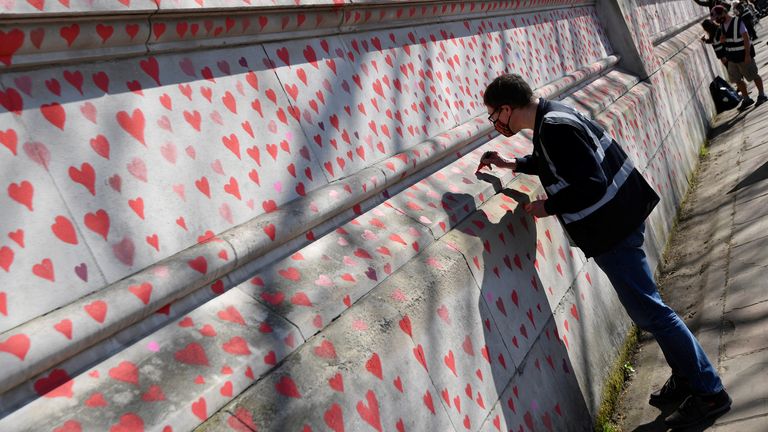
Families who lost loved ones to COVID are experiencing “continuing anxiety” and “considerable unease” over two PR firms hired by the official public inquiry, a preliminary hearing has been told.
A report by the Open Democracy website said M&C Saatchi and 23Red had both worked for the government during the pandemic – with the latter said to have worked for the Cabinet Office – but were now working on a “listening project” for the UK COVID-19 Inquiry.
Pete Weatherby KC, representing the COVID-19 Bereaved Families for Justice group, said it had raised fears about conflicts of interest.
Becky Kummer, a spokesperson for the group who lost her father in the pandemic, said the two firms “shouldn’t be anywhere near the COVID inquiry, never mind being responsible for how it reaches those worst affected by the pandemic”.
Politics latest: Minister vows to ‘stand firm’ on public sector pay
A spokeswoman for the inquiry confirmed to Sky News that M&C Saatchi had been awarded the contract and that 23Red had been sub-contracted by the company “to provide the inquiry with expertise on working with external organisations to support public engagement and encourage people to share their experiences”.
But she insisted the contract was awarded “in line with Crown Commercial Service’s robust procurement regulations, ensuring transparency and value for money for the taxpayer”.
She added: “We were satisfied there are no conflicts of interest for the appointed suppliers which would affect the delivery of the listening exercise.”
Sky News understands M&C Saatchi did not work on the government’s public health response to the pandemic, but on other campaigns over that period, including on obesity, smoking and cancer.
However, the Cabinet Office confirmed that 23Red did work with them on marketing projects during COVID.
We also understand all bidders for the contract were required to declare any potential conflicts of interest and required to show they had suitable safeguards to mitigate any risk of conflict of interest.
‘Acute concerns’
Speaking at this morning’s preliminary hearing for the inquiry, Mr Weatherby spoke about the inquiry’s “listening project” to gather the experiences of people impacted by the pandemic in a less formal setting.
He said it would be “be extremely difficult for bereaved families and [so it is] extremely important if it works and what is needed is clarity and certainty”.
But the lawyer said there was “continuing anxiety regarding the companies involved… and it is well known these are matters of acute concerns to the families”.
Mr Weatherby said he was not commenting on whether the reports in Open Democracy were correct or whether there was an actual conflict of interest.
But he said there was “considerable unease about this”, adding: “The consequences of not taking a robust and transparent approach to these issues are really quite simple – less families will be prepared to engage and the whole exercise will have less utility and less credibility.”
Mr Weatherby said he and the families wanted “a clear indication from the inquiry as to it using companies which have undertaken what might reasonably be perceived to be a conflict of interest”, and for contracted firms “to make a public statement concerning any work they have done that could be perceived to be in conflict”.
‘Modest delay’
During this morning’s hearing, the lead KC on the inquiry, Hugo Keith, also asked for a “modest delay” to the start of the public hearings because of the amount of documents that needed to be gone through.
He said “literally thousands of manual redactions” were having to be made to government policy documents and emails relating to the UK’s preparedness for a pandemic as junior officials names need to be taken off – then be checked again by the relevant departments.
He called for a provisional start date of May to early June.
Mr Wetherby, along with other representatives of bereaved families around the UK and the Trades Union Congress, agreed to the new timetable, with the KC saying there was “no alternative” with disclosure “very much in the foothills”.
But he called for the process to be changed so the parties involved could immediate access to the evidence, rather than waiting for the disclosure.









